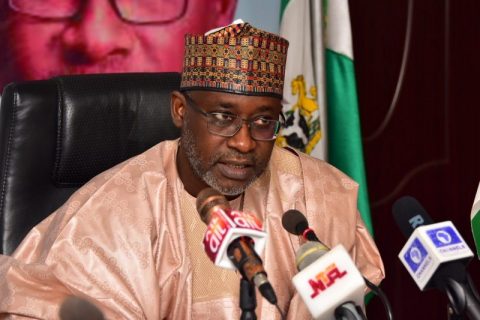Nigeria Renews Commitment To UN Water Convention
Latest Headlines, News Across Nigeria Thursday, July 28th, 2022
(AFRICAN EXAMINER) – The Nigerian Government has reaffirmed its commitment to accede to the United Nations Convention on the Protection and Use of Trans boundary Watercourse and International Lakes.
Nigeria’s Minister of Water Resources, Engr. Suleiman Adamu gave the assurance in Abuja at the National Workshop on Nigeria’s proposed accession to the United Nations Water Convention.
The minister said Nigeria attaches significant importance to trans boundary water cooperation, adding that the West African nation will commit to a road map for its accession to and future implementation of the UN Water Convention.
“As the most populous country in Africa where the majority of our over 206 million people depend on water that we share with neighbouring countries. The government of Nigeria encourages all nations with which it shares water resources to accede to the Water Convention and ensure its full implementation.
“This offers a crucial means for us to work together to strengthen the foundations for peace, stability and sustainable development in the Lake Chad and Niger basins, for the mutual benefit of our populations and natural environment”, he said
Nigeria shares at least one trans boundary water body with each of its neighbouring states. Current water challenges in Nigeria are due to the rapidly increasing demand as a result of population growth, increased urbanization, increase in irrigation farming and industrialization.
The Lake Chad Basin is the largest inland drainage area in Africa and covers an area of 2,434,000 km2, equal to 8 percent of the total area of the African continent. The basin extends through Algeria, Cameroon, Niger, Nigeria, Central Africa Republic, Chad, and Sudan.
In Nigeria, the basin drains about 20 percent of the country. Damming, over extraction, climate change, and drought are all contributing to the rapid depletion of Lake Chad, which has decreased in size by 90 percent over the last 60 years. This has led to significant unemployment and insecurity challenges in the region.
Nigeria is also home to about 80 percent of the 100 million people residing in the basin of the Niger river, which crosses Algeria, Benin, Burkina Faso, Cameroon, Cote d’Ivoire, Guinea, Mali, Niger, Nigeria and Chad before emptying through the Gulf Guinea into the Atlantic Ocean.
Secretary of the Water Convention, Ms Sonja Koeppel said with these shared waters increasingly threatened by water scarcity linked to climate change, pollution, and rising demands on their use, “trans boundary water cooperation is crucial for peace, conflict prevention, sustainable development and human well-being”.
This, according to her, is particularly relevant in regions such as the Lake Chad and Niger basin where water is closely related to security, livelihoods and regional stability. As an effective global legal and intergovernmental framework and platform for cooperation and sustainable management of shared waters, including ground waters, the Water Convention helps countries to address key challenges.
These challenges have been exacerbated by persistent drought and have resulted in greater dependence on groundwater resources. Effective trans boundary cooperation can however, help address these challenges. In this regard, Nigeria has signed several trans boundary agreements over its shared water resources.
Notably, Nigeria is party to the Lake Chad Basin Commission and the Niger Basin Authority.
Notably, the secretariat of the Convention on the Protection and Use of Trans boundary Watercourses and International Lakes (Water Convention) has a long-standing cooperation with these two river basin commissions.
Adopted on 17 March 1992 in Helsinki, Finland, the Water Convention aims to strengthen cooperation in the field of trans boundary waters and to promote protection and sustainable use of trans boundary surface waters and ground waters.
Initially limited to the Pan-European region, the 1992 Water Convention has been opened up for accession by all United Nations Member States, since 1 March 2016.
Five African countries have already acceded to it and many others are in various stages of the process of accession.
The 1992 Water Convention, the Secretariat of which is hosted by the United Nations Economic Commission for Europe (UNECE), and the 1997 United Nations Convention on the Law of Non-
Navigational Uses of International Watercourses (Watercourses Convention) provide unique global legal frameworks and essential intergovernmental platforms to support cooperative development and prevent conflicts related to shared waters.
The United Nations Secretary-General, António Guterres encourages countries to accede to and implement both conventions, noting that the 1992 Water Convention is a powerful tool to advance cooperation, prevent conflicts and build resilience. It currently t has 46 Parties worldwide.
With a view to possible accession of Nigeria to the Water Convention, since October 2021, the Federal Ministry of Water Resources has held several preparatory meetings at the regional level to sensitize the relevant stakeholders in Nigeria on the Water Convention.
These efforts have culminated in this national workshop convened to raise broader awareness of the Convention and commit to a road map for accession and eventual implementation.
The workshop aims to contribute to the comprehensive understanding by the Nigerian competent authorities of the Water Convention, its provisions and obligations, its work on the ground as well as the benefits and possible challenges for Nigeria to accede to it, in order to facilitate the preparations for accession and eventual implementation.
The workshop was well attended by government officials and high-level speakers from different international organisations. It also featured a press conference where journalists asked questions relating to the theme of the workshop.
A statement issued by Thomas Croll-Knight of the Information Unit of the UNECE noted that Nigeria’s planned accession to UN Water Convention could be a tipping point for cross-border water cooperation, contributing to security, climate adaptation and sustainable development in Lake Chad and Niger basins
“Nigeria has taken a significant step towards ensuring the sustainable management of its cross-border waters with a milestone commitment to join and implement a United Nations treaty known as the Water Convention.
“Nigeria’s accession would help consolidate the fast-building momentum for water cooperation in Africa and, given its role as the largest economy in Africa and position in key shared basins, prove a catalyst for more countries to join and reap the benefits of implementing the Water Convention”, the statement stressed.
Related Posts
Short URL: https://www.africanexaminer.com/?p=79263




















